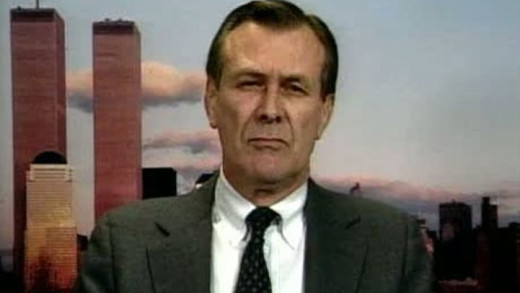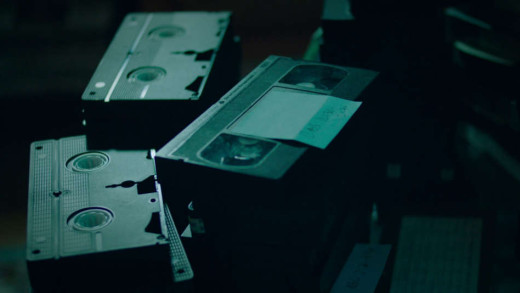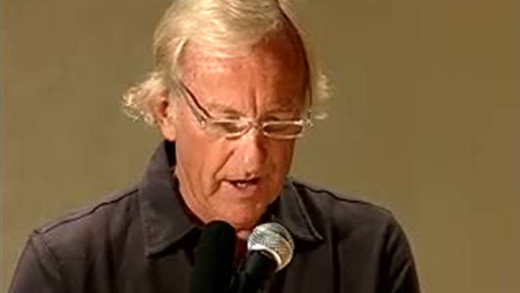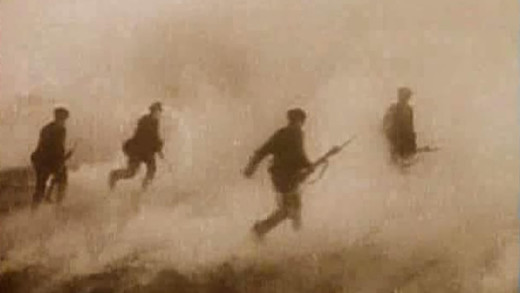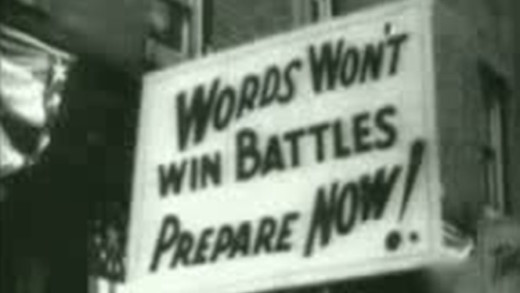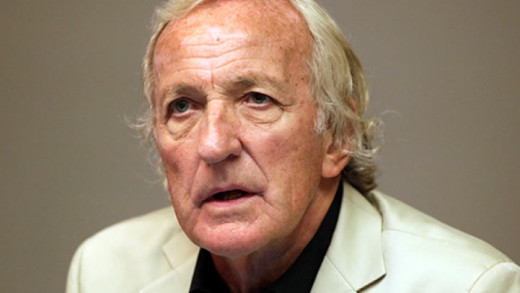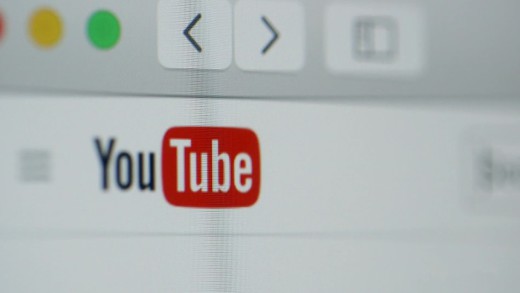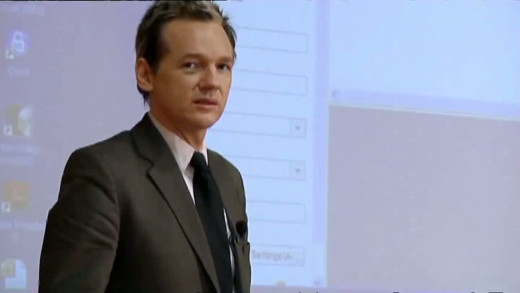Is the threat of radical Islamism as a massive, sinister organised force of destruction—specifically in the form of al-Qaeda—a myth perpetrated by politicians across the globe, but particularly the American neo-conservatives, in order to unite and justify empire? This series of films charts the rise of both groups and movements, drawing comparisons between them and their origins, to provide much-needed and missing context to the War of Terror.
This short film uses the history and figure of the Murdoch media empire as a vast invasive machine, to draw parallels to new media machines such as Google that are not only more invasive, but more pervasive than anything the Murdoch media empire has managed. Why are we not more concerned about this?
The Disney Company's massive success in the 20th century is based on creating an image of innocence, magic and fun for kids. Its animated films in particular are almost universally lauded as wholesome family entertainment, enjoying massive popularity among children and endorsement from parents and teachers around the world. This film takes a close look at Disney, to analyse the world these films create for kids and the stories they tell and propagate; contextualised by the cultural pedagogy of Disney's conglomerate mass-media control and vast corporate power. Including interviews with social commentators, media scholars, child psychologists, kindergarten teachers, multicultural educators, college students and children, Mickey Mouse Monopoly provokes audiences to confront assumptions about an institution that is virtually synonymous with childhood pleasure.
Slim Hopes
Slim Hopes shows how the stories advertising tells us about food, femininity, and the female body directly contribute to anorexia, bulimia, and other life-threatening eating disorders. From ads that glamorise emotional eating with catch-phrases like "you can never have too much," to ads that promote thinness and tell women to watch what they eat, Slim Hopes takes the advertising industry to task for sending young women in particular, a set of deeply contradictory and unhealthy messages about food and body image.
Marion Stokes was secretly recording television twenty-four hours a day for thirty years. It started in 1979 with the Iranian Hostage Crisis at the dawn of the twenty-four hour news cycle, and ended in 2012 while the Sandy Hook massacre played on television as Marion passed away. In between, Marion recorded on 70,000 VHS tapes, capturing revolutions, lies, wars, triumphs, catastrophes, bloopers, talk shows, advertising--all of which deeply show how television has shaped the world of today. Remarkably prescient, Marion knew this, and saved it as a form of activism, knowing that archiving everything that was said and shown on television was part of the fight for the truth and historical memory, keeping those in power accountable. At the time, the public didn’t know it, but TV networks themselves were not keeping archives of their material, with huge swathes of recorded history lost. If it wasn't for Marion, and the Internet Archive that will soon digitise her tapes for prosperity and free public access, these records would be lost forever. This film is about a radical Communist activist, who became a fabulously wealthy recluse archivist, and whose work was unorthodox, but also genius, even though she would pay a profound price for dedicating her life to such a visionary project.
Australian journalist, author and film maker John Pilger speaks about global media consolidation, war by journalism, the US military and its quest for domination/hegemony in the post 9-11 era and the false history that is presented in the guise of 'objective' journalism...
The Search For Truth In Wartime investigates the changing face of war reporting and the role of the media during wartime, in context with the Crimea through the two World Wars, to Vietnam and the Falklands. "What is the role of the media in wartime? Is it simply to record, or is it to explain? And from whose point of view--the military, the politicians or the victims?"
The legacy of the Bush administration and the so-called "War on Terror" includes a new logic that stretches well beyond the realm of overzealous security agencies, airport security and international relations, and into suppressing public protest; expanded surveillance aimed at entire populations, but especially activists; and mobilising fear for social control. Special police techniques have even been developed and applied in order to specifically suppress dissent and manage protests, especially in the wake of the rising anti-globalisation movements towards the turn of the millennium. Preempting Dissent provides a quick overview of how some of this logic developed, as well as a glimpse of how political protest in the West has been shaped and controlled in the "post-9/11" years, up to and including the so-called Occupy movement. By provoking a reflection of the implications of the logic of the "War on Terror" and how its applied to stifle political protest, Preempting Dissent aims to lay some of the groundwork to develop more effective resistance tactics.
TV Family
In 1960, NBC aired what is widely considered to be the first reality television show in American broadcast history. Billing itself as a new kind of visual reporting, the show was called Story of a Family, and it purported to document the day-to-day lives of the 10-member Robertson family of Amarillo, Texas. While the show has long since faded from public memory, media scholars and television historians have long recognised its significance as a precursor to the "unscripted programming" that dominates television today. TV Family draws on this history by interviewing several of the children featured in Story of a Family, to offer a fascinating behind-the-scenes account of how the show was made, and what it means to shape culture. Weaving personal anecdotes with commentary from historians and scholars, TV Family reveals the story of how the show's producers carefully choreographed the way they wanted the family to appear to the American public—all in the name of "authenticity." The result is an eye-opening look at one of television's earliest successes in shaping the reality of family life in commercially viable ways.
Control Room presents a rare window into the US invasion of Iraq from the perspective of Al Jazeera, the Arab world's most popular news outlet. Widely criticized and condemned by military figureheads, government officials and the mainstream media in the west for reporting with a "pro-Iraqi bias", airing civilian causalities, as well as showing footage of American POWs, Control Room reveals the situation in Iraq that the US government does not want you to see...
Obey
Obey is a video essay based on the book "Death of the Liberal Class" by author and journalist Chris Hedges. The film charts the rise of corporatocracy and examines the trending possible futures of obedience in a world of unfettered capitalism, globalisation, staggering inequality and environmental crisis -- posing the question, do we resist or obey?
Consumer capitalism dominates the economy, politics, and culture of our age, despite a growing trove of research showing that it is a failed system. In this illustrated presentation, media scholar Justin Lewis makes a compelling case that capitalism can no longer deliver on its myth of the dream and its promise to enhance the quality of life. He argues that changing direction will require changing our media system and our cultural environment, as capitalism has become economically and environmentally unsustainable. This presentation explores how the media and information industries make it difficult to envision other forms of life by limiting critical thinking and keeping us locked in a cycle of consumption, and shows us that change will only be possible if we take culture seriously and transform the very way we organise our media and communications systems.
American Anarchist is the story of The Anarchist Cookbook, and the role it's played in the life of its author, William Powell. Written as a teenager--and first published at the apex of the counterculture of the 1970s to protest the United States' involvement in the Vietnam War--part manifesto, part bomb-making manual, The Anarchist Cookbook went on to sell over 2 million copies and has been associated with decades of anti-government attacks, abortion clinic bombings, school shootings, and domestic terrorism. Powell, now 65 and haunted by his creation, confronts his work and its consequences. We see how in 1976, 5 years after writing the book, he left the United States, leading an itinerant life and later becoming a teacher for emotionally disturbed children, the same sorts of kids that carried the Columbine High School massacre, the Colorado high school shooting and the 2012 Aurora shooting. American Anarchist is a cautionary tale of youthful rebellion, unforeseen consequences, and a universal story of an older person wrestling with their younger past.
To many in both business and government, the triumph of the self is the ultimate expression of democracy, where power is truly moved into the hands of the people. Certainly the people may feel they are in charge, but are they really? The Century of the Self tells the untold and controversial story of the growth of the mass-consumer society. How is the all-consuming self created, by whom, and in whose interest?
While advertising is clearly a visible component of the corporate system, perhaps even more important and pervasive is the often-invisible partner—the public relations industry. Toxic Sludge Is Good For You illuminates this hidden sphere of the corporatocracy, examining the way in which the management of public discourse has become central to how society has been usurped and is controlled by political and economic elites. The film tracks the development of the PR industry from its early efforts to win popular support for World War I, to the role of crisis management in controlling damage to the corporate image, while analysing the tools PR people use to manipulate public perceptions.
Social media networks purport the ability to interact with culture—talking directly to artists, celebrities, movies, brands, and even one another—in ways never before possible. But is this real empowerment? Or do marketing companies still hold the upper hand, as before? Generation Like explores how the perennial quest for identity and connection is usurped in the pervasive game of cat-and-mouse by vast corporate power in the extensive machine for consumerism that is now the online environment. The audience becomes the marketer; buzz is subtly controlled and manipulated by and from real-time behavioural insights; and the content generated is sold back to the audience in the name of participation. But does the audience even think they're being used? Do they care? Or does the perceived chance to be the 'next big star' make it all worth it?
Spin the Bottle critiques the role that popular culture plays in glamorising excessive drinking and high-risk behaviour, in contrast to the ways alcohol affects the lives of real young men and women in reality. This film decodes the power and influence of seductive media images to show how they shape personal identity when linked to the use of alcohol. Nowhere is this link more apparent than on America's college campuses. By exploring the party scene, Spin the Bottle also shows the difficulties young people have in navigating a cultural environment saturated with messages about gender and alcohol. Interviews with health professionals provide a clear picture of how drinking impacts student health and academic performance, but it is the students' own experiences and reflections that tell the real story behind alcohol's alluring public and cultural image.
After Truth
After Truth is about the growing proliferation of modern disinformation, where almost anybody with a computer and social media access can have a powerful platform without oversight, influencing the information experiences of billions of people. The melting pot is catalysed by Facebook, Twitter, Reddit, 4chan, and other websites that spread disinformation to huge audiences with a profit incentive, competing to capture everyone's attention. After Truth asks the question about where all this is heading, by exemplifying events such as Jade Helm, Seth Rich, and Pizzagate, but also profiling some major and minor personalities involved in spreading disinformation, conspiracy theories, fear, and uncertainty. With an empire in collapse, and physical reality being increasingly replaced by popular postmodern theories of "there is only subjective truth," this film not only presents the challenge of returning to what is real, but the task of stopping disinformation from continuing to divide, confuse, distract, and destroy.
Renowned independent journalist John Pilger speaks about complicity and compliance, censorship and citizen journalism as well as issues such as the holocaust in Iraq and Kevin Rudd's shrewd political apology to the Indigenous peoples of Australia as Prime Minister. "These days, a one-dimensional political culture ensures that few writers write, or speak out, as they did in the last century. They are talented, yet safe. In the media, the more people watch, the less people know. Beneath the smokescreen of objectivity and impartiality, media establishments too often ventriloquise the official line, falling silent at the sight of unpleasant truths."
Cover Up -- Behind The Iran-Contra Affair is a thorough investigation into information suppressed during the Iran-Contra hearings in 1987 where it was found that senior officials in the United States government secretly facilitated the sale of arms to Iran. The film reveals a shadow government of former CIA operatives, drug smugglers, top US military personnel and others, revealing evidence of the history of CIA involvement in drug running from the Vietnam heroin era to the Central American cocaine epidemic -- raising serious questions about the so-called "war on drugs" and other government movements since the 1980s...
This short video explores how the online world has overwhelmingly become the popular outlet for public rage by briefly illustrating some of the many stories of everyday people which have suddenly become public enemy number one under the most misunderstood of circumstances and trivial narratives. With the web acting like a giant echo-chamber, amplifying false stories and feeding on the pent-up aggression of the audience watching the spectacle, The Outrage Machine shows how these systems froth the mob mentality into a hideous mess, as a good example of where the spectacle goes and how its intensity has to keep ratcheting up in order maintain the audience attention, in a culture of dwindling attention spans, distraction and triviality.
At the turn of the millennium, a group of eleven girls aged 8 to 16 from a variety of socio-economic backgrounds were interviewed about their views on media culture and its impact on their lives. Their insightful and provocative responses reveal how the attitudes and expectations of young girls are influenced by a saturated media culture. Using excerpts culled from a typical week of television broadcasting alongside the interviews, What a Girl Wants aims to provoke debate about the effects of media culture and, ideally, act as a catalyst for change in media content.
This short film uses the story of Richard Nixon's paranoia to explore how a similar outlook has been perpetuated on the larger social scale by the new media age. Skimming through the evolution of the mainstream media via television and newspapers, this short film comments on how politics has been paralysed by a media that has taken serious threats and sensationalised them, resulting in political cynicism and disengagement, which in-turn feeds a viscous cycle of nihilism and further sensationalist politics and media.
Arguing that advertising not only sells things, but also ideas about the world, The Codes of Gender examines the commercial culture's inability to let go of reactionary gender representations. Presenter Sut Jhally's starting point is the breakthrough work of the late sociologist Erving Goffman, whose 1959 book The Presentation of the Self in Everyday Life prefigured the growing field of performance studies. Jhally applies Goffman's analysis of the body in print advertising to hundreds of print ads today, uncovering an astonishing pattern of regressive and destructive gender codes. By looking beyond advertising as a medium that simply sells products, and beyond analyses of gender that tend to focus on either biology or objectification, The Codes of Gender offers important insights into the social construction of masculinity and femininity, the relationship between gender and power, and the everyday performance of cultural norms.
By the early 1990s, solid research and overwhelming evidence had prompted a growing awareness of the epidemic nature of date rape, especially on college campuses. But, starting in 1993, the media used the anecdotal comments of one young woman, Katie Roiphe, to undermine efforts to stop this continuing crime against women. How did this happen?
How has a culture of readily-accessible and ubiquitous pornography that is largely free-to-view on laptops, mobile phones, and televisions, shaped young peoples' nascent ideas and expectations of love, sex and relationships? This short follows a group of teenagers who, with unflinching honesty and realism, reflect on the influence of porn on their lives. Has it changed their sexual tastes and behaviours? What are the differences between boys and girls in their approach to porn? What is the effect of the porn industry's move into ever more hardcore scenes? With exclusive behind the scenes access to the stars and directors at the centre of the international porn industry in LA and Budapest, Love and Sex in an Age of Pornography provides intimate insights into all sides of the porn industry--from the gritty details of porn's production, to its effects on curious youngsters.
Spin
Using the 1992 presidential election as his springboard, film-maker Brian Springer captures the behind-the-scenes manoeuvrings of politicians and newscasters in the early 1990s. Pat Robertson banters about "homos," Al Gore learns how to avoid abortion questions, George Bush talks to Larry King about halcyon and other drugs—all presuming they're off-air. Composed of 100% unauthorised satellite footage, Spin is a surreal expose of media-constructed reality, posing larger questions about the functioning of not only corporate media, but the political systems in which they support and how this in-turn plays to the media-constructed reality and so on.
When Julian Assange arrived in Sweden in August 2010 he was greeted like a hero. But within weeks there was a warrant out for his arrest and he was being investigated on allegations of rape and sexual misconduct. Today, Assange is cornered in the Ecuadorean Embassy in London, arguing he won't receive justice if he's taken to Sweden and that authorities in the United States are building a case for his extradition. In Sex Lies And Julian Assange, Andrew Fowler retraces what happened in those crucial weeks while Julian Assange was in Sweden. What was the nature of his relationship with the two women? And what happened with the police and prosecutors?
